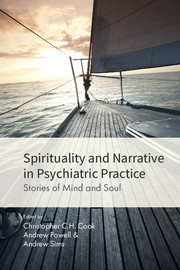Book contents
- Frontmatter
- Contents
- List of contributors
- Foreword
- Preface
- 1 Narrative in psychiatry, theology and spirituality
- 2 Spirituality and transcultural narratives
- 3 Psychopathology and the clinical story
- 4 Helping patients tell their story: narratives of body, mind and soul
- 5 Gods lost and found: spiritual coping in clinical practice
- 6 Stories of joy and sorrow: spirituality and affective disorder
- 7 Stories of fear: spirituality and anxiety disorders
- 8 Stories of transgression: narrative therapy with offenders
- 9 Narratives of transformation in psychosis
- 10 My story: a spiritual narrative
- 11 God's story revealed in the human story
- 12 Meaning without ‘believing’: attachment theory, mentalisation and the spiritual dimension of analytical psychotherapy
- 13 Stories of living with loss: spirituality and ageing
- 14 Beginnings and endings
- Index
9 - Narratives of transformation in psychosis
Published online by Cambridge University Press: 02 January 2018
- Frontmatter
- Contents
- List of contributors
- Foreword
- Preface
- 1 Narrative in psychiatry, theology and spirituality
- 2 Spirituality and transcultural narratives
- 3 Psychopathology and the clinical story
- 4 Helping patients tell their story: narratives of body, mind and soul
- 5 Gods lost and found: spiritual coping in clinical practice
- 6 Stories of joy and sorrow: spirituality and affective disorder
- 7 Stories of fear: spirituality and anxiety disorders
- 8 Stories of transgression: narrative therapy with offenders
- 9 Narratives of transformation in psychosis
- 10 My story: a spiritual narrative
- 11 God's story revealed in the human story
- 12 Meaning without ‘believing’: attachment theory, mentalisation and the spiritual dimension of analytical psychotherapy
- 13 Stories of living with loss: spirituality and ageing
- 14 Beginnings and endings
- Index
Summary
Narrative is powerful. It creates selves. It creates cultures. It weaves the context of our lives and experiences. Where those experiences lead beyond consensual reality, as with both the psychotic and the mystical, the narrative that contextualizes them is particularly striking. Our society is inclined to pathologise this facet of human experience. Satyin and Katie, whose accounts follow, are, like me, involved in developing and running the Spiritual Crisis Network (www.spiritualcrisisnetwork.org.uk), an organization that offers a hopeful and a spiritual narrative for those going through disturbing and destabilising periods in their life. Hilary is in sympathy with the aims of the Spiritual Crisis Network and is an important contributor to a supportive Yahoo email list with the same theme. Their narratives illustrate how even the darkest of times can herald transformation. My own interest in this is as a clinical psychologist with over 20 years’ practice in psychiatric rehabilitation and for the past 10 years working in acute mental health services. Honouring the narratives brought by the service users and developing a therapeutic approach that incorporates their transformative potential is central to my practice.
All three personal contributions describe major breakdowns involving the psychiatric services. For Satyin this meant a long period in hospital and for Hilary a number of hospital stays. Satyin and Katie now see their ‘episodes’ as behind them and are forging new lives with confidence. Hilary is still recovering from her last, most disturbing, episode and for her there is a sense that the journey is not finished. Two of the contributors were given diagnoses at different times, including schizophrenia and bipolar disorder. Katie has never received a formal diagnosis. However, the approach described in this chapter is not diagnosis specific; it has been put to the test over 10 years in the National Health Service (NHS) mental healthcare (mostly in-patient) and with the full range of presentations expected in such a service.
- Type
- Chapter
- Information
- Spirituality and Narrative in Psychiatric Practice , pp. 108 - 120Publisher: Royal College of PsychiatristsPrint publication year: 2016



